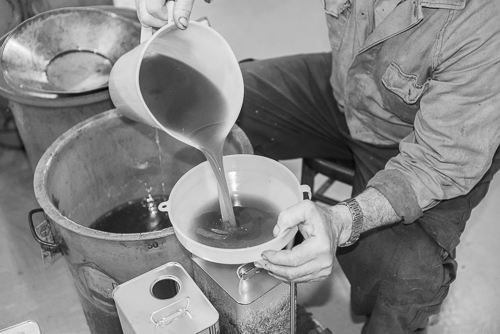Surprisingly, in the heart of the small historic centre of Orbetello, which looks like a place where «everyone» is drinking coffee with their friends at sidewalk cafes, there is an olive oil mill using millstones. In fact, although it is located inside a rather imposing brick building, it’s so unassuming that one can easily walk past without noticing that there is an artisan and long-lasting olive oil mill inside. However, being attentive, it’s possible to see a small sign with the text: «Frantoio Arienti di Arienti Elia», else it’s anonymous. Anyway, during the olive harvest season, it’s possible to hear machines at work, while walking past the olive oil mill.
Upon entering this olive oil mill, it’s highly probable that you will meet the owner Elia Ariente, a man who is 73 years old and who could have been a pensioner, but prefers to go on working. He told me that this enterprise was founded in 1918 by his grandfather who bought this building at the same time. He continued running this place until his son Luigi took over, who also ran it for many years before leaving it to his son Elia. The commune of Orbetello accepts that this olive oil mill contiunes operating, but when Elia becomes a pensioner, it has to move out of the city centre.
Interestingly, this olive oil mill is using two old millstones, making it possible to watch olives being crushed like it has been done for ages except that the millstones were being turned by a mule or an ox. Instead, most olive oil mills use machines that crush olives inside a closed chamber. Being a small company, the owner receives his customers personally and he puts their harvests in special boxes if the producers have put their olives in other types.
When the millstones were ready, the owner and a worker would pour the contents of the boxes into a large metal bowl below the continuously rotating millstones. When all the boxes of a client had been emptied into the bowl, they closed a grille as a protection against injury. Then, the olives were gradually crushed, leaving a pulp in the bowl. Simultaneously, the drupes inside the olives were also crushed because they contain some olive oil. While the millstones were rotating, Elia made me notice a hole in the wall, which had to be made 32 years ago when he had bought a larger olive press. After all the olives had been turned into paste, two workers stopped the millstones and opened a lid at the base of the bowl such that parts of the paste fell down into another box. Then, they pumped the paste onto a slowly rotating metal disk such that the paste was spread evenly on the disk. Next, they placed the disk, which had a large hole in the centre on a wide, vertical metal pole which was mounted on a small cart. Next, they placed a disk with some kind of fibre on top of the metal disk. Thereafter, they repeated this procedure until the disks were reaching almost to the top of the metal pole.
Next, they pushed the cart into a press where all the disks with olive paste in between were compressed at the same time until an oily liquid was forced to flow out of the paste. Then, a pump would pump the liquid into a centrifuge whose purpose was to separate water and olive oil. Finally, the owner poured the fresh olive oil into metal containers, closed them and gave them to the producer who followed the extraction of the olives attentively. After having paid the owner, they left, while new ones kept arriving.
When the compression was finished, the workers released the pile of disks and lifted them up one by one. The paste had been turned into solid disks and they were thrown back into the olive press in order to be crushed once more by the millstones.
Before, there were olive oil mills at the railway station of Orbetello, at Porto Ercole and at Porto Santo Stefano, but gradually they all closed down. According to Elia, it requires a great deal of passion to maintain and run an olive oil mill and be responsible for all expenses, including salaries of the workers.
Regarding quality and price of the olive oil, they are similar to those from modern olive oil mills, according to Elia. One reason may be that he has gradually paid off all his loans during many years, while modern olive oil presses have invested in expensive machinery, whuch requires a long time to pay off their loans.

